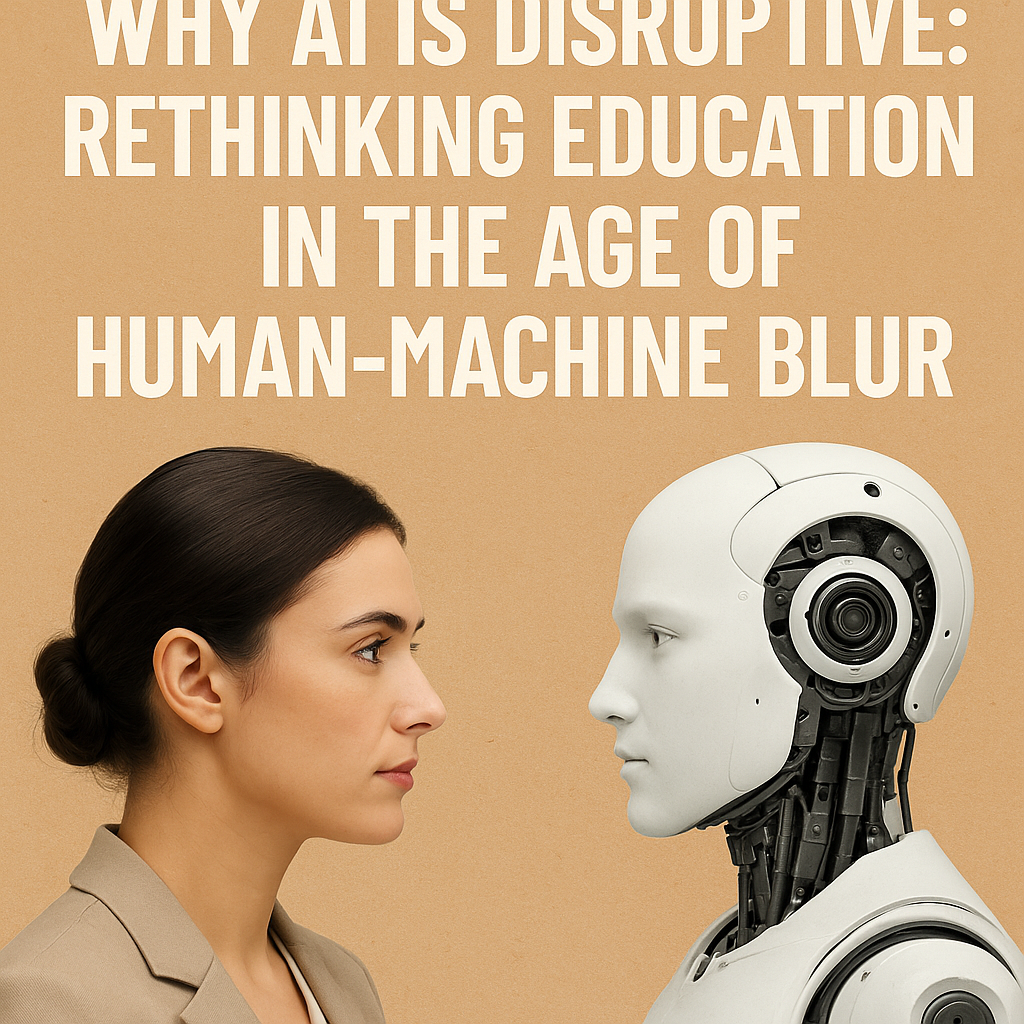Why AI is Disruptive: Rethinking Education in the Age of Human-Machine Blur
Introduction: The AI Moment Has Arrived
Artificial Intelligence isn’t just a new tool; it’s a force that is reshaping how we think, work, and learn. As philosopher Tobias Rees insightfully puts it, AI is not disruptive because it will outsmart us—it’s disruptive because it dissolves a boundary we once thought was unshakable: the distinction between human and machine. This realization is sending shockwaves through institutions, especially education, where the foundations of knowledge, assessment, and learning are being questioned. We are now in an AI moment—a turning point where urgent questions must be asked and honest answers must follow.
The False Comfort of “Catching Cheaters”
In academia, the response to AI has largely been reactive. Educators scramble to detect AI-generated content in assignments, while developers create tools to outsmart those detectors. This cat-and-mouse game obscures a deeper issue: a system more focused on control than on learning. Are we assessing students to help them grow or just to catch them failing? This obsession with detection technology reveals our reluctance to rethink assessment altogether.
Instead of doubling down on surveillance, this is the time to revisit our purpose. Why do we assess? What do we define as intelligence? Is writing a good essay an indicator of deep thinking, or simply the ability to follow format and logic?
What is Knowledge For? Revisiting Old Questions
AI’s growing presence challenges us to confront foundational questions that have long been sidelined:
- What is the purpose of knowledge?
- Why do we create, seek, and share knowledge?
- Who defines its value?
In many higher education systems, including in Pakistan, these questions are buried under a neoliberal vision. Here, education is equated with “human capital development,” and a student is valued primarily for employability. The success of faculty is often measured by publication count rather than contribution or impact. AI now threatens this mechanistic model because machines can produce “publishable” content faster, cheaper, and possibly more persuasively.
The Neoliberal Model of Education is Being Tested
Pakistan’s HEC Vision 2025 embodies a global trend: treating education as a tool for economic growth. This framework promotes a narrow view of students as future workers and of teachers as content producers. In this system, knowledge is commodified, universities become knowledge factories, and success is measured in data points—grades, publications, employability stats.
But AI disrupts this entire model. If machines can produce data-driven content more efficiently, where does that leave the human in education? If our students are reduced to job-seeking machines and AI outperforms them at those jobs, what’s the point of schooling at all?
A New Educational Paradigm: Humans as Ecosystems
Scholars like Blackie and Luckett offer an alternative vision. They argue that AI’s rise invites us to broaden our understanding of human intelligence. So far, education has prized analytical, linear thinking because it serves the global economy. But this ignores equally essential human faculties: intuition, emotion, imagination.
In this paradigm shift, we must view “humans not as machines, but as ecosystems.” This reframing embraces complexity, relationships, and wholeness. It recognizes that our brains are not detached processors but parts of embodied, context-aware individuals. Knowledge isn’t a static entity to be consumed but something lived and situated in culture, space, and time.
The Myth of Universal Knowledge
AI models are often trained on vast datasets from dominant cultures, reinforcing the myth of universal knowledge. But the idea that one type of reasoning or knowledge is universally valid is both flawed and dangerous. In the age of AI, we need to return to situated knowledge—the idea that every person brings unique perspectives rooted in their context.
This shift also demands that we transcend rigid disciplinary boundaries. Real-world problems aren’t chemistry or sociology problems; they’re human problems. Cross-disciplinary collaboration fosters richer, more adaptable learning environments, better suited to a world in flux.
The Purpose of Education in a Post-AI World
The AI moment should not be co-opted by EdTech companies looking to sell new monitoring tools under the same neoliberal banner. Instead, it should force us to ask: what kind of world are we educating students for?
If education is only about producing efficient workers, AI will inevitably outperform us. But if education is about cultivating humanity—critical thinking, ethical reasoning, empathy, and creativity—then we remain irreplaceable.
This isn’t just about resisting automation. It’s about reclaiming the soul of education.
Conclusion: A Call to Reflect, Not Just React
We are living through a pivotal moment in the history of learning. The arrival of generative AI should not trigger panic or blind adoption but thoughtful reflection. What we do next matters.
We must resist the urge to fall back on outdated systems of control and ranking. Instead, we need to embrace education as a transformative space where knowledge is co-created, not merely delivered. It’s time to view students not as potential cheaters or future workers, but as thinking, feeling, meaning-making humans.
As discussed in our post on “The Future of Learning in the Age of Automation,” the only way forward is to humanize education even more as machines become more capable. Because when the line between human and machine blurs, our humanity becomes the most precious thing we can teach.
